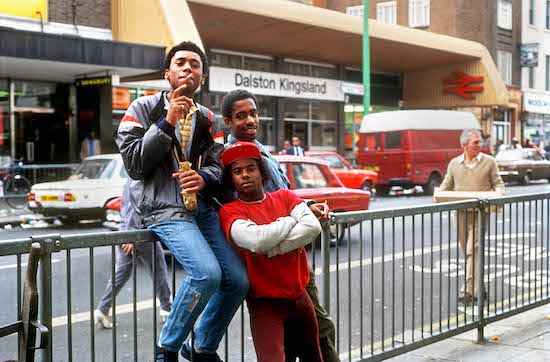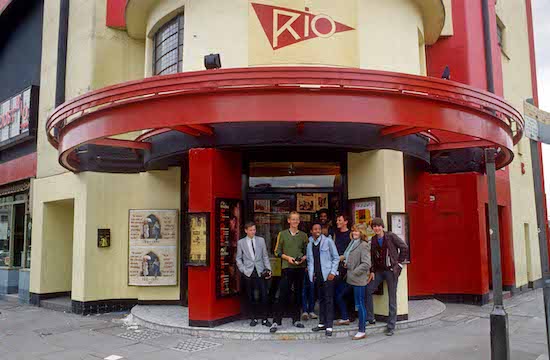Around 11 A.M. on the morning of Thursday 22 November 1990, one of the dinner ladies at a certain primary school in the borough of Hackney, east London, came into each classroom to announce that Margaret Thatcher had resigned. As far as I remember we then had the rest of the day off, in celebration; only years later did I realise this was not normal.
The past is a foreign country: they do things differently there. And the past presented in the photos of the Rio Cinema Archive, the subject of a forthcoming book I’m publishing– photos of the 1980s which map loosely on to those childhood memories of Hackney – seems like a lost world, for so many reasons.
A beginning of an explanation, and an explanation of a beginning: the Rio is a much-loved cinema on Kingsland High Street in Dalston, Hackney. The building started as a silent picture house in 1909 and lived a full and varied life, including incarnations as a cartoon cinema and an ‘adult’ palace with live burlesque striptease supplementing the blue movies. In 1975 it had a short stint as a Kung Fu, Elvis and Bollywood revival cinema, but – no surprise here – that didn’t last and it was taken over by an independent cooperative, finally reopening as a community-run cinema in 1979, about the time I was making an entrance a few streets away.
The Rio was, from the outset, socially and politically engaged. It began to programme films for the different local communities – Turkish, Afro-Caribbean, south Asian – and hosted feminist film events and lesbian and gay groups. In the 1980s it ran fundraisers for political prisoners in Northern Ireland and Astrid Proll, an early member of the Red Army Faction (AKA the Baader-Meinhof Gang), who in exile had sought refuge in Hackney and was being threatened with deportation.
It was, as Emma Warren has written in these pages, one of those increasingly rare spaces: “under-the-radar locations where we can be left alone to do stuff, where culture can be generated, and where we can be more ourselves.” All pertinent to the emergence of the Rio Tape/Slide Newsreel Group (RTSNG), the progenitors of this recently rediscovered archive.
Back one step further: another of those spaces, and more-or-less opposite the Rio, was Centerprise. Founded in 1971 by an African-American youth worker and a collective of well-meaning British activists, it was for many years Hackney’s only bookshop. More than that, it was a café, event space, classroom, publisher and advice centre. Centerprise had been running photography courses, but the ample basement space at the Rio suggested expanded possibilities. A recording studio for women was installed, and a darkroom-cum-newsroom for the Tape/Slide group around 1983. From here, the RTSNG taught photography and sound-recording skills to local young unemployed people, and sent them out to report on Hackney life. The resulting ‘newsreels’ were then shown before the regular film programme in the Art Deco auditorium upstairs.
So what? As one of the original participants, Will Kemp, wrote in 1983: “The production of a slide newsreel had two main purposes: to provide interesting and entertaining coverage of the local news that would be ignored elsewhere – or to cover news from an independent viewpoint, and to give a voice to the young people of the area. The newsreel would add a genuinely local flavour to the Rio’s nightly programme and give the audience greater involvement in it . . . We have screened varied and entertaining material and given a mouthpiece to some of the local young unemployed. It’s all part of our aim to make the media more accessible to the public. After all, anyone can take a few snaps. What makes the Rio different is that those pictures can appear alongside a multi-million [-pound] blockbuster.”

Back to now: the group’s photos, which peter out sometime in 1988, came to light in 2016 during renovation work to create a second screen – 12,000 slides in a battered filing cabinet in the Rio basement (very little of the sound recordings survive). Since then the images have gained a following on Instagram, and now we are making a book. There’s a definite joy in the nostalgia of the old-style hats and coats – Instagram comments often run along the lines of “My nan drove a car like that,” and “Look at Woollies on the High St!” – but there is also something genuinely radical in the pictures.
First off, the Tories were by all accounts hopping mad that a group could take public money and use it to present an alternative view that subverted their narratives about Hackney, a place they manifestly did not give two shits about. The GLC under Ken Livingstone aided and abetted the Rio’s taking from the rich and giving to the poor. Second is the role of the photographers themselves. Back in the late 70s and early 80s, ideas of community photography were circulating in left-wing journals like Camerawork – projects, in places like Handsworth in Birmingham, that gave control of the processes of representation and production to marginalised or under-represented people. These are now being re-evaluated and seen as culturally significant. And whether or not you care about theory and praxis in now-defunct magazines, there’s something about people taking photos of people who are like them. There’s no detachment or power imbalance in these Tape/Slide Newsreel Group images. You are inside something: a participant, not just an observer.
What stands out most clearly in the archive now is the history of opposition. It tells the story of so many fights: anti-Apartheid, anti-Reagan, CND and Greenham Common, Stop the City, squat the borough, stand with the miners and oppose NHS cuts. And racism and police brutality in particular: in 1983, the RTSNG photographed the great Trinidadian writer CLR James’s visit to Hackney (the Hackney Archives, where their slides will end up, are housed in a library that bears his name); by 1984 it was covering the GLC’s Anti-Racism Year and the protests on the anniversary of the death of Colin Roach. Roach was a 21-year-old Black man who died in the foyer of Stoke Newington police station in 1983. The official line was that it was suicide, but since he died from a gunshot to the back of the head this didn’t add up. His family’s fight for justice became totemic both in Hackney and in the wider Black community across London and the UK. The Tape/Slide reporters also covered the second-anniversary demonstrations.
Protest aside, there is also a sense in the archive of vibrant communities coming together, of festivals and celebrations – people who are enduring hard times but also determined to live their lives and enjoy themselves. Maybe we’re missing that now in Austerity Britain, 30 years after Thatcher exited stage right, and, in particular, as we emerge from all our separate lockdowns? Making the book, and seeing the Instagram account grow feels a little like jumping into the feedback loop that was created all those years ago and re-presenting the archive to the local community – to those who were there then and also those who weren’t. Closing the circle.
As I write this, the Rio has been shut for getting on for three months because of Covid-19. Some of the proceeds of making the book will go to support the cinema through its reopening, and to running new community archiving and youth workshops. But, being frank, this is a critical time for the Rio, for other cinemas like the Rio (there aren’t many) and for cinemas in general. It’s time to ask the question: what are cinemas – and what is cinema – for? Maybe the Rio and its archive can help answer that.
Find out more about The Rio Tape/Slide Archive Book here
Money from the book project will go towards supporting the Rio, London’s oldest community-run cinema, and running new archiving and youth workshops. Consider helping the Rio survive the COVID-19 crisis by becoming a member here


